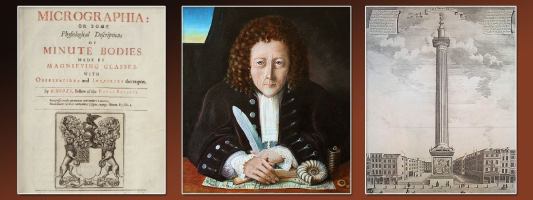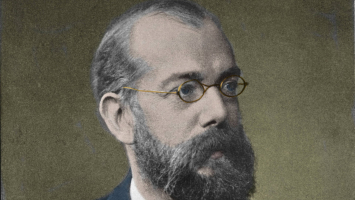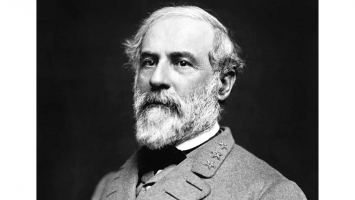Top 8 Interesting Facts about Robert Frost
Although Robert Frost passed away on January 29, 1963, more than fifty years ago, his poetry continue to be relevant today, inspiring writers ranging from ... read more...George R.R. Martin to John F. Kennedy. Although “The Road Not Taken” is the song that most people are familiar with, Frost is much more than that. Let's follow Toplist to discover some interesting facts about Robert Frost.
-
William Prescott Frost Jr., a journalist, and Isabelle Moodie welcomed Robert Frost into the world in San Francisco, California. His mother was a Scottish immigrant, and his father was descended from Nicholas Frost of Tiverton, Devon, England, who had arrived to New Hampshire in 1634 on the Wolfrana. Samuel Appleton, one of the first residents of Ipswich, Massachusetts, and Rev. George Phillips, one of the first residents of Watertown, Massachusetts, were the ancestors of Frost.
Together with his sister Jeanie, Robert Frost attended high school in Lawrence, Massachusetts. One of the interesting facts about Robert Frost is he displayed great promise when he was young, to the point where he graduated with Elinor White, his high school sweetheart, as valedictorian. But during college, they split up. Elinor chose St. Lawrence University, while Frost enrolled at Dartmouth College. He was able to publish “My Butterfly: An Elegy” in the weekly literary journal “The Independent” during his brief time at Dartmouth.
He spent two months at Dartmouth College, which was a sufficient time for him to be admitted into the Theta Delta Chi fraternity. Frost went back to his hometown to work as a teacher and to help his mother with her class of rowdy boys. He also helped his mother deliver newspapers and maintain carbon arc lamps in a factory. He felt that poetry was his genuine calling and did not appreciate these occupations.Robert Frost married Elinor in 1895 after graduating from Dartmouth. He worked in farming and some teaching to provide for his four kids. Robert Frost's ability to resume his college studies at Harvard University is an intriguing fact, but he eventually had to quit out for medical reasons.
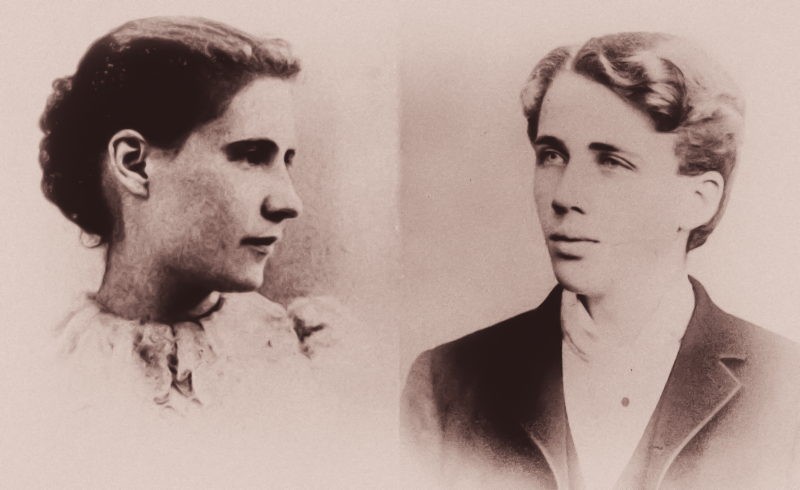
Photo: Frost and Elinor - dartmouthalumnimagazine 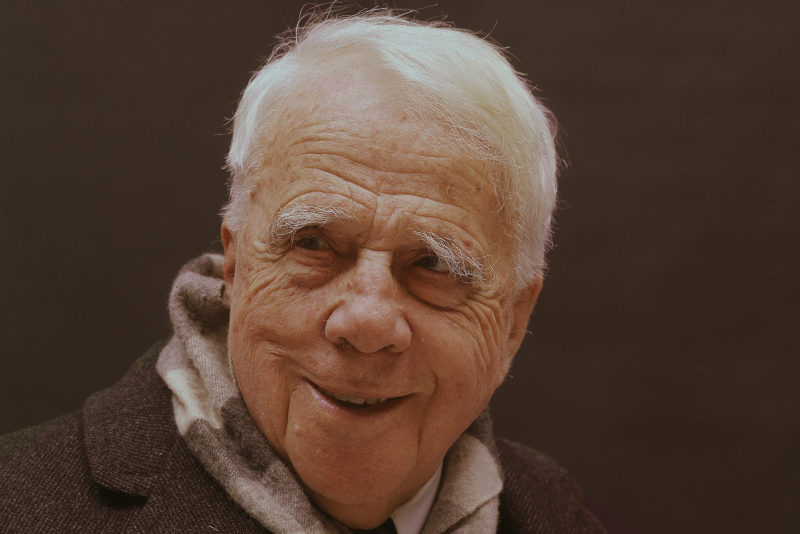
Photo: Robert Frost - poetryfoundation -
His debut poem, "My Butterfly. An Elegy," which appeared in the November 8, 1894, issue of the New York Independent, was sold for $15 ($470 in today's money) in 1894. Elinor Miriam White declined his marriage proposal when he proudly announced his success because she wanted to finish college (at St. Lawrence University) first. When Frost returned from his expedition to Virginia's Great Dismal Swamp, he asked Elinor once more. She consented after receiving her degree, and on December 19, 1895, they were wed in Lawrence, Massachusetts.
From 1897 to 1899, Frost studied at Harvard University, but he left on his own will because of sickness. Frost on the farm for nine years while writing early in the mornings and penning many of the poems that would eventually become famous. Shortly before his passing, Frost's grandpa bought a property in Derry, New Hampshire, for Robert and Elinor. In the end, his farming endeavors were a failure, and he turned back to teaching as an English instructor at Plymouth, New Hampshire's New Hampshire Normal School (now Plymouth State University) from 1906 to 1911 and the Pinkerton Academy in New Hampshire.
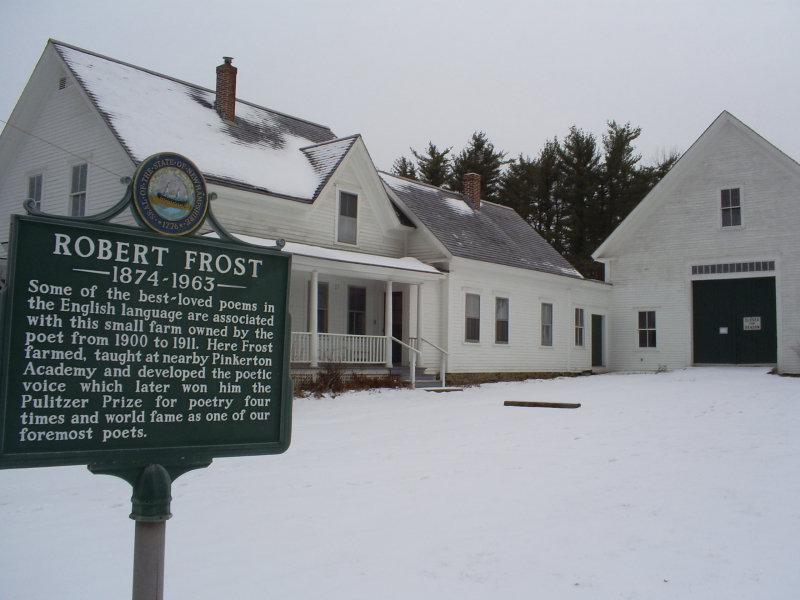
Photo: Robert Frost Farm (Derry, New Hampshire) - wikipedia 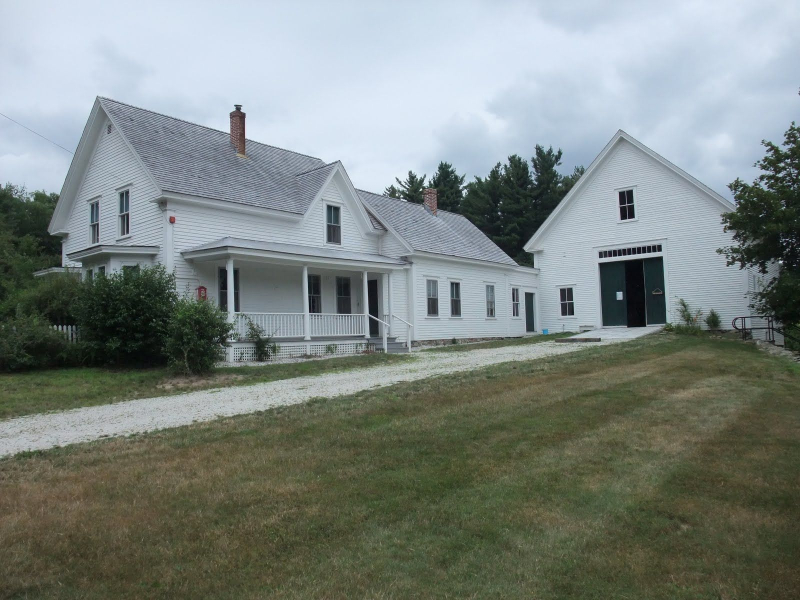
Photo: Robert Frost Farm (Derry, New Hampshire) - pinterest -
At the age of 40, only one of Frost's works has been published, and that was back when he was a student at Dartmouth. This frustrated Robert Frost, who made the unusual decision to leave his farm in Derry and come to England, where he heard that publishers were more receptive to emerging poets.
A little village in Buckinghamshire west of London called Beaconsfield was where Frost and his family originally settled after sailing to Great Britain in 1912. The next year, “A Boy's Will” his debut collection of poetry, was released. It included poems like “Mowing”, “The Tuft of Flowers” and “Storm Fear”. He made some significant connections while he was in England, including T. E. Hulme, Ezra Pound, and Edward Thomas (a Dymock poet and the inspiration for Frost's “The Road Not Taken”). Frost eventually disliked Pound's attempts to influence his American prosody, despite the fact that Pound was the first American to write a positive review of Frost's work.
He published another collection named “North of Boston” the following year. Some of Frost's more well-known poems, including “The Death of the Hired Man,” “Mending Wall” and “Home Burial,” were included. After his first two poetry collections, A Boy's Will and 1914, were published in London, Frost made friends with or met many contemporary poets there (North of Boston).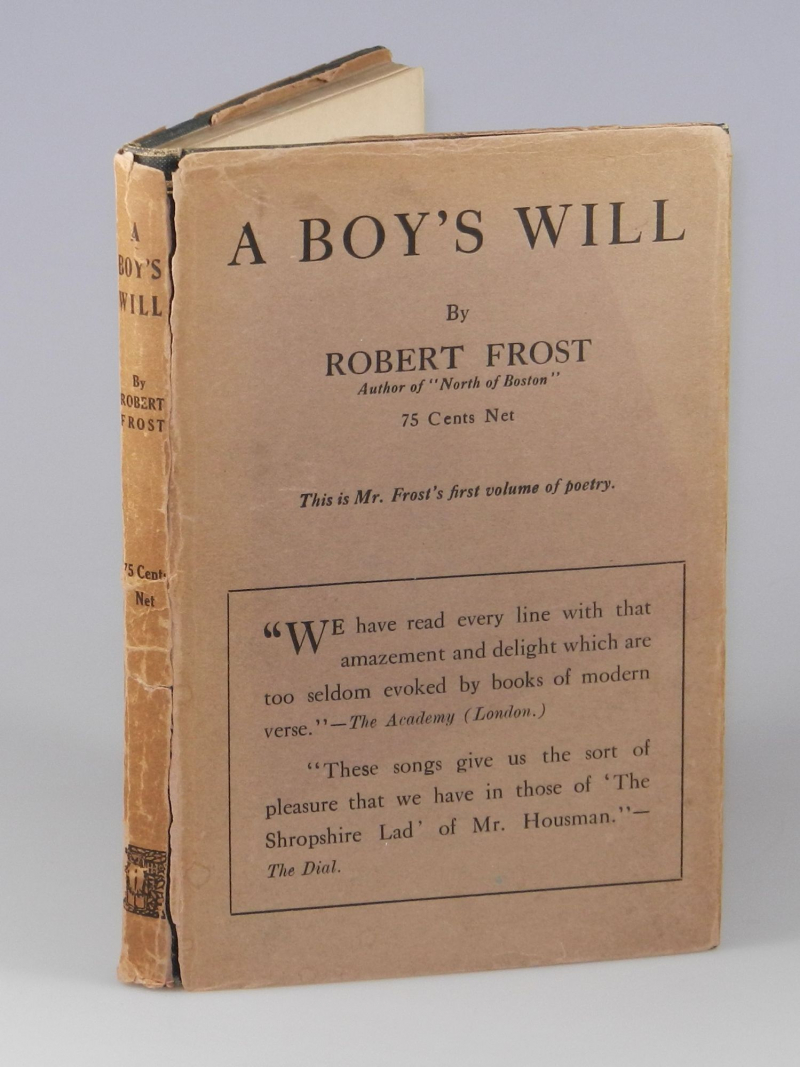
Photo: A Boy's Will - churchillbookcollector 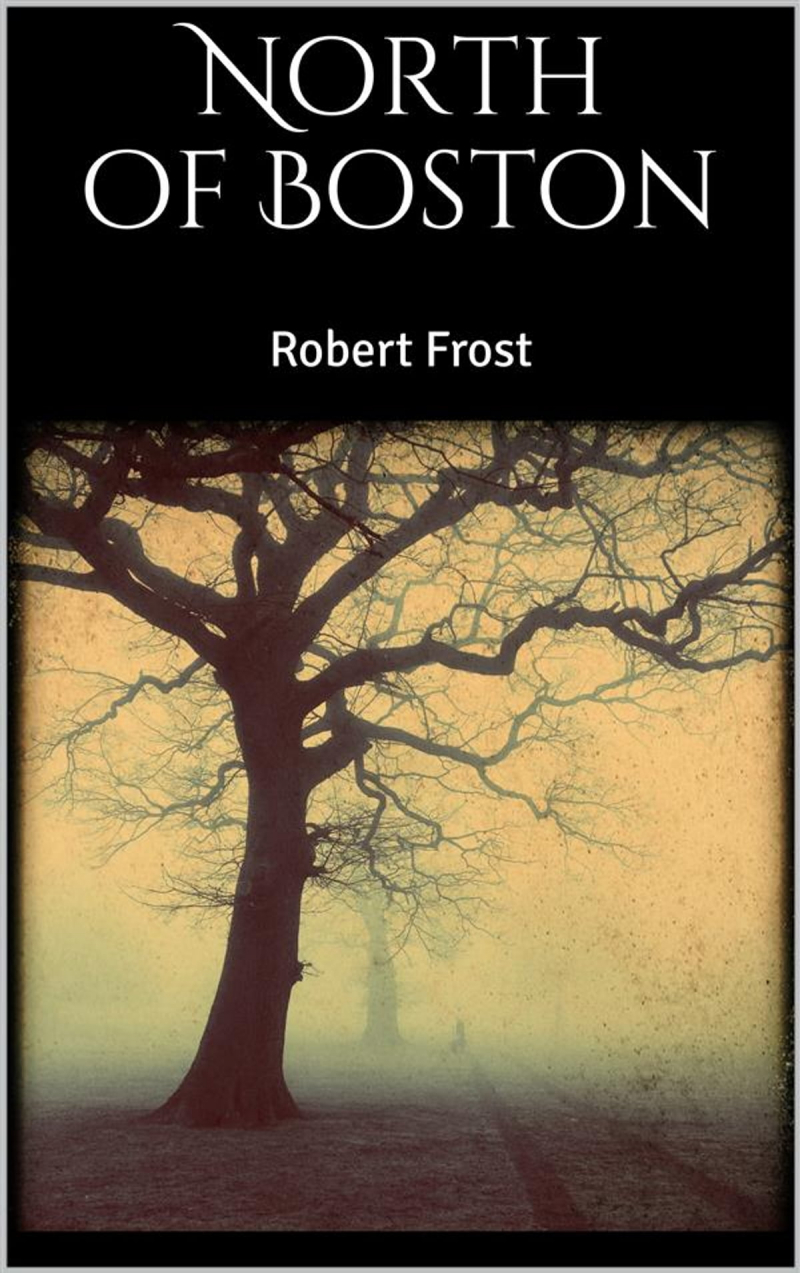
Photo; kobo -
Robert Frost wrote the narrative poem “The Road Not Taken” which was eventually included as the opening poem in the 1916 collection Mountain Interval. It was first published in The Atlantic Monthly's August 1915 issue. Although its interpretation is recognized for being complicated and potentially varied, its core topic is the divergence of pathways, both literally and metaphorically.
Frost lived in England from 1912 to 1915, when he became friends with author Edward Thomas. Frost and Thomas grew close and went on numerous walks together. They came across two roads one day while walking together. Thomas struggled to make a decision about which route to pursue, and frequently regretted it in the future. Frost sent Thomas an advance copy of “The Road Not Taken” after he returned to New Hampshire in 1915. Thomas read and pondered the verse intently. Some academics assert that Thomas' decision to enlist in the First World War was motivated by “The Road Not Taken”. In the end, he lost his life in the Battle of Arras.
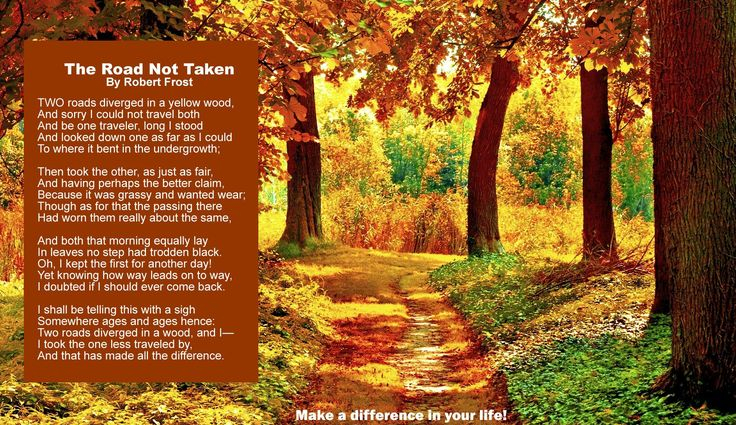
Photo: The Road Not Taken - gocnhosantruong 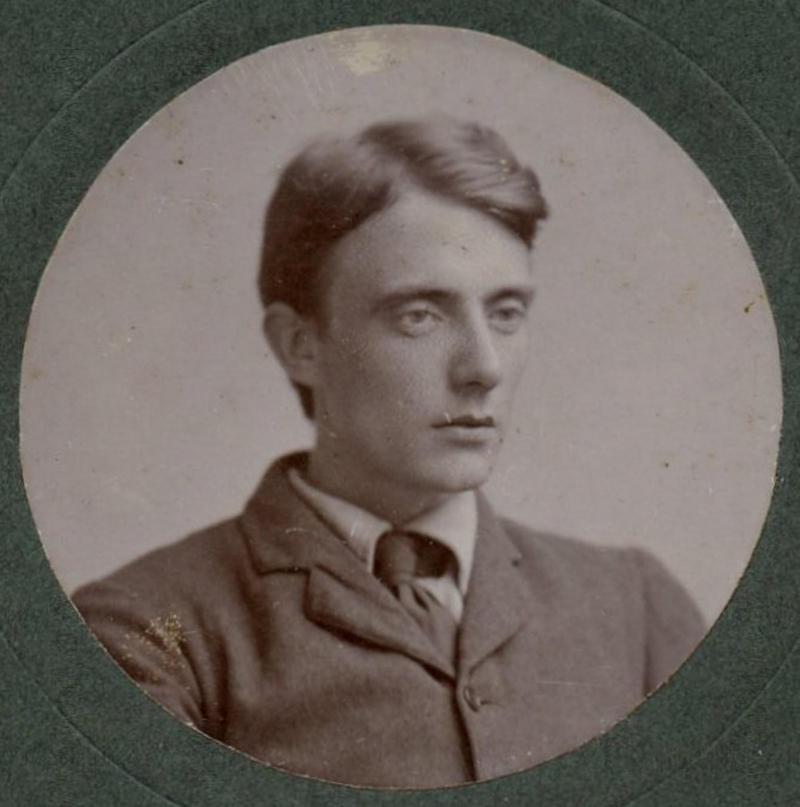
Photo: Edward Thomas - enitharmon -
A fact that it's ironic that Frost had to travel to England to gain acceptance in the US. Thanks in large part to the efforts of poet Amy Lowell, his fame was able to cross the Atlantic and return to his native country. She came across Frost's book while visiting England and was very taken by it. She prepared her evaluation and looked for publishers who would publish Robert Frost's work after she got back to the US.
One of the interesting facts about Robert Frost is that he and his family, who were unaware of the fact that he was starting to gain notoriety, sailed back to the US at the onset of the First World War. Following the publication of Lowell's essay about his work in “The New Republic” Henry Holt released “North of Boston” and “A Boy's Will” in the US. His poetry were suddenly in high demand from The Atlantic, which had previously rejected his earlier submissions. Frost was now being honored in his native country at this point.
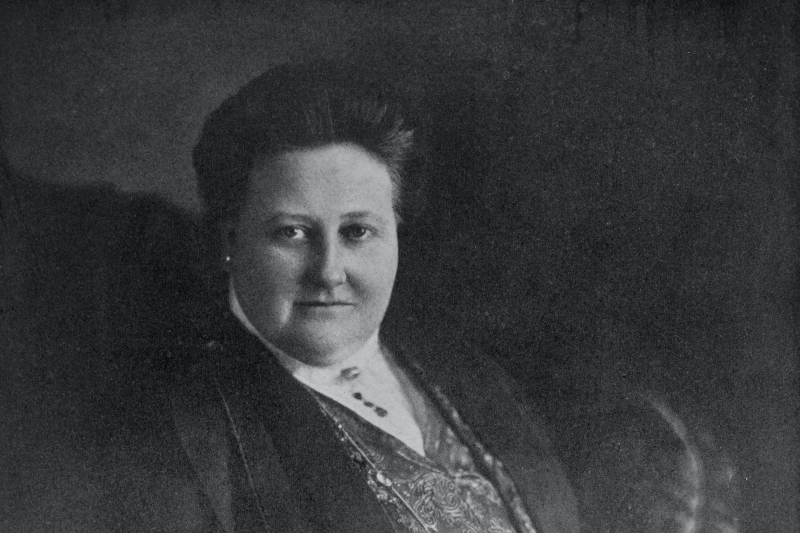
Photo: Amy Lowell - poetryfoundation 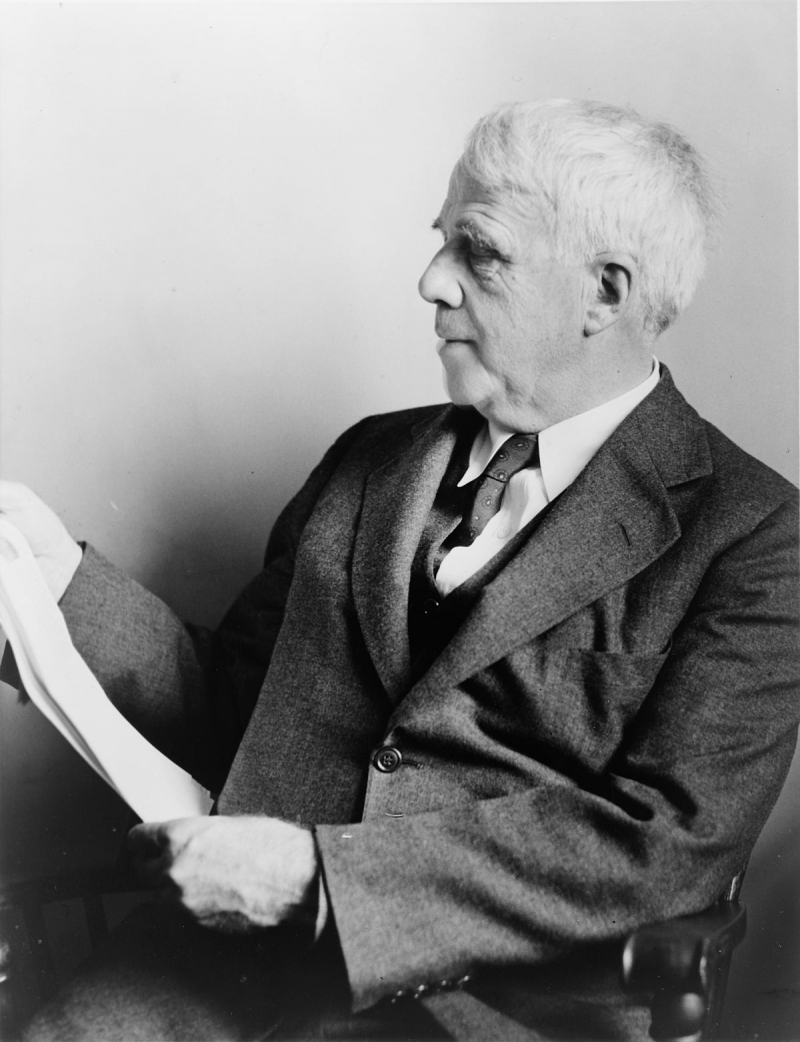
Photo: Robert Frost - wikipedia -
Frost was chosen as Vermont's Poet Laureate by the Vermont State League of Women's Clubs in June 1922. When a New York Times editorial sharply condemned the Women's Clubs' choice, Sarah Cleghorn and other women defended Frost in letters to the publication. By means of Joint Resolution R-59 of the Acts of 1961, which also established the office, Frost was appointed Vermont's Poet Laureate on July 22, 1961.
Frost, a genuine literary genius, won the coveted Pulitzer Prize four times; he is still the only person to have done so. For the enhanced version of “New Hampshire”, he earned his first one in 1923. Seven years later, with his book “Collected Poems”, he received another award. With “A Further Range” and “A Witness Tree”, he won his third and fourth Pulitzers, respectively.
Despite not winning a Pulitzer, his other efforts were just as noteworthy. They consist of “In the Clearing”, “Steeple Bush”, and “West-Running Brook”. Frost received 31 nominations for the Nobel Prize in Literature.
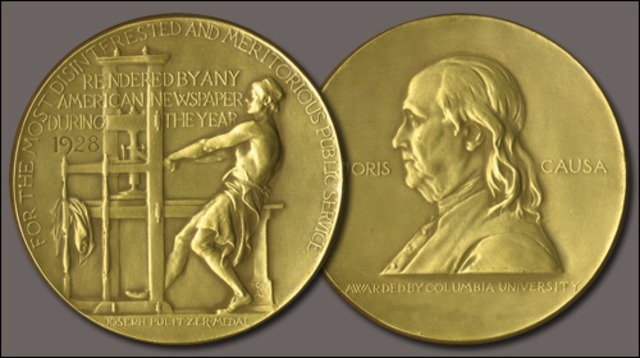
Photo: Pulitzer Prize for Poetry - Wikipedia 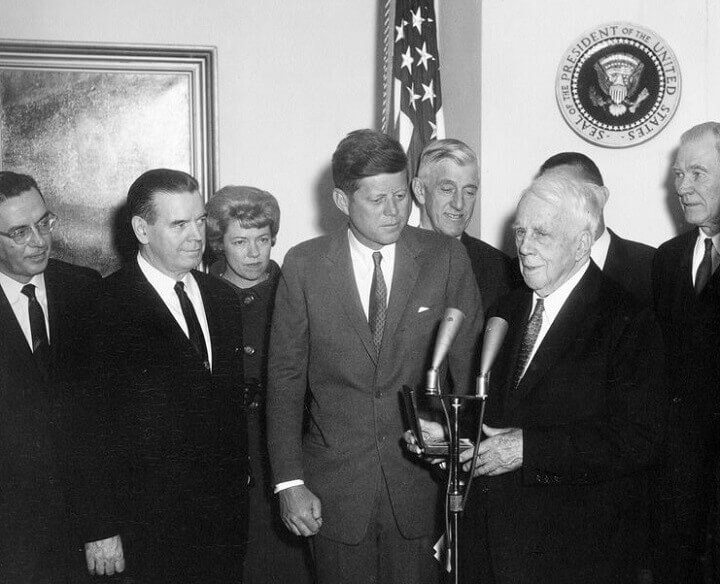
Photo: Robert Frost - robertfrost -
Frost never meant “The Road Not Taken” to be taken so seriously; he composed the poem as a private jest for his friend Edward Thomas. Nevertheless, it is frequently read at high school and college graduations as a warning to build new pathways. Together, he and Thomas liked to go on walks, although Thomas was never sure which way he wanted to go. When he did make a decision, he frequently regretted not going in a different direction.
In the 2008 biography Fall of Frost by Brian Hall, the New York Times wrote, “Whichever direction they walk, they're bound to miss something excellent on the opposite path”. “The “sigh” stated in the final verse could be interpreted as either an emotion of regret or satisfaction.
Frost was taken aback when his audience started to interpret the poem as a metaphor for individual freedom. He complained to Thomas that the poem “The Road Not Received” was “taken quite seriously... despite doing my best to make it evident by my manner that I was joking....” after reading it to some college students. I apologize.
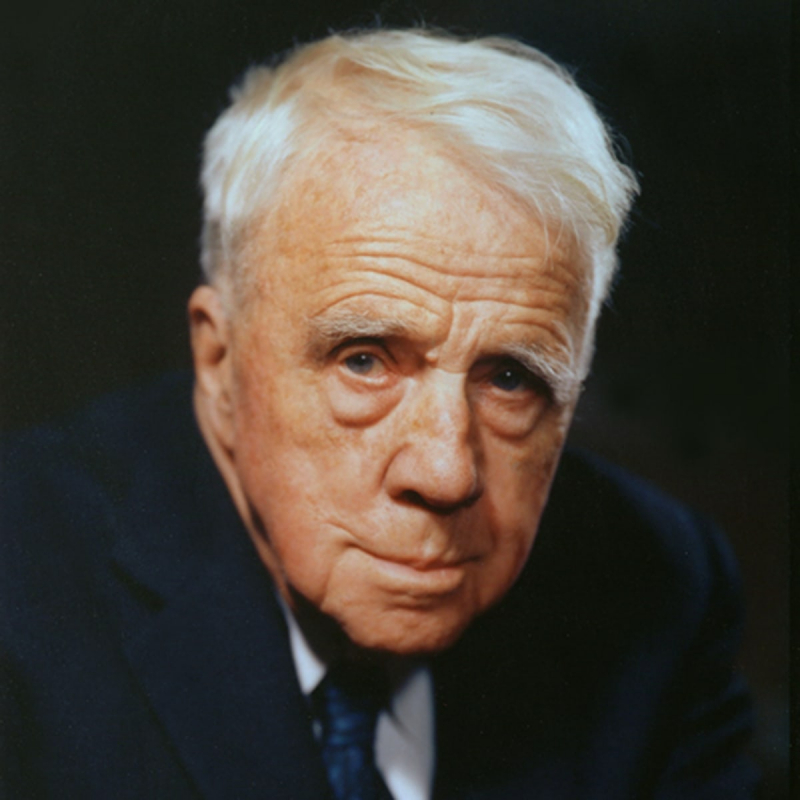
Photo: Robert Frost - tranthinguyetmai.wordpress 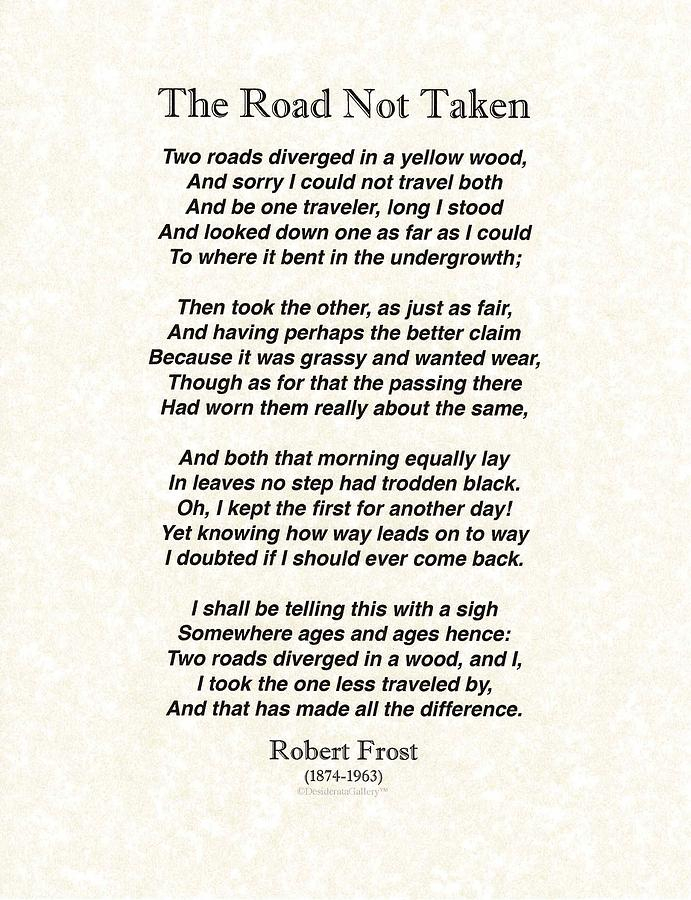
Photo: The road not taken - pixels -
The 1965 Harvard alumni directory shows Frost was awarded an honorary degree there. One of the interesting facts about Rober Frost is he never obtained a college diploma, although he did get more than 40 honorary degrees, including two from Dartmouth College and one each from Princeton, Oxford, and Cambridge colleges. During his lifetime, schools in Fairfax, Virginia, Lawrence, Massachusetts, and Amherst College's main library all bore his name, as did the Robert Frost Middle School.
Frost received the United States Congressional Gold Medal in 1960, which President Kennedy finally presented to him in March 1962, “In appreciation of his poetry, which has enhanced the culture of the United States and the philosophy of the world.” He received the Edward MacDowell Medal for distinguished contribution to the arts from the MacDowell Colony the same year, 1962.
On January 20, 1961, when Frost performed at John F. Kennedy's inauguration, he was 86 years old. Frost first tried to read his specially written poem “Dedication”, but was unable to do so due to the glare of the sun. As a substitute, he performed his poem “The Gift Outright” from memory.
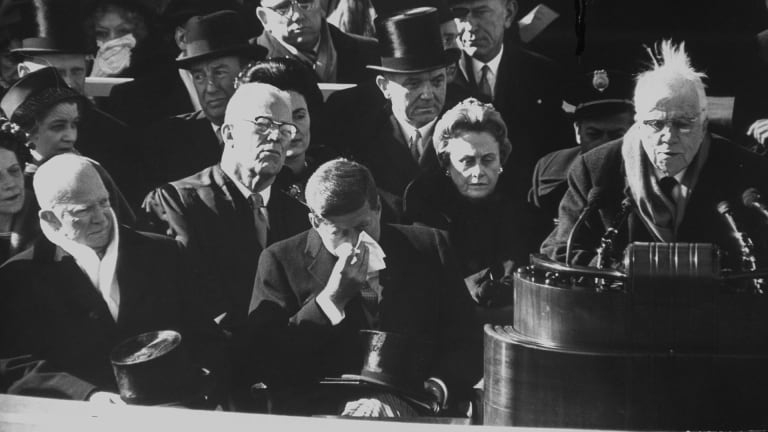
Photo: John F. Kennedy's inauguration - biography 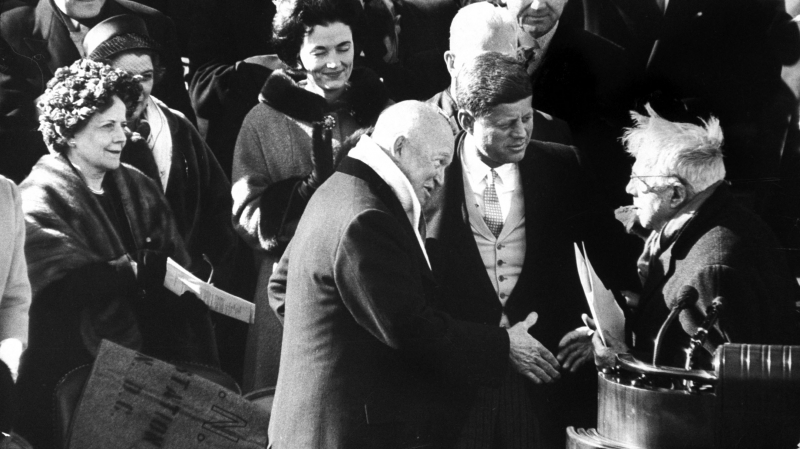
Photo: John F. Kennedy's inauguration - cnn










